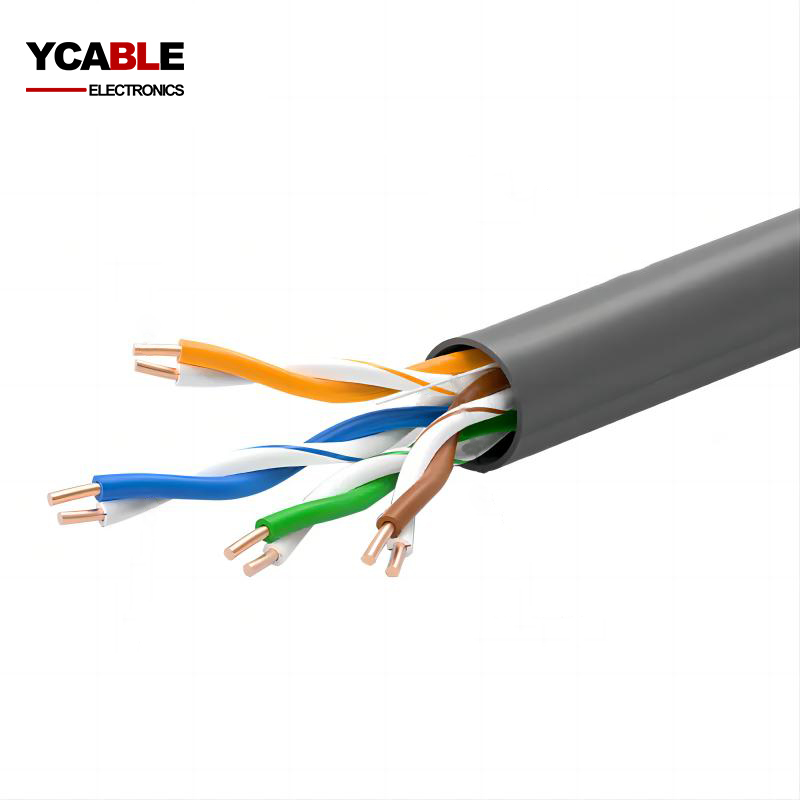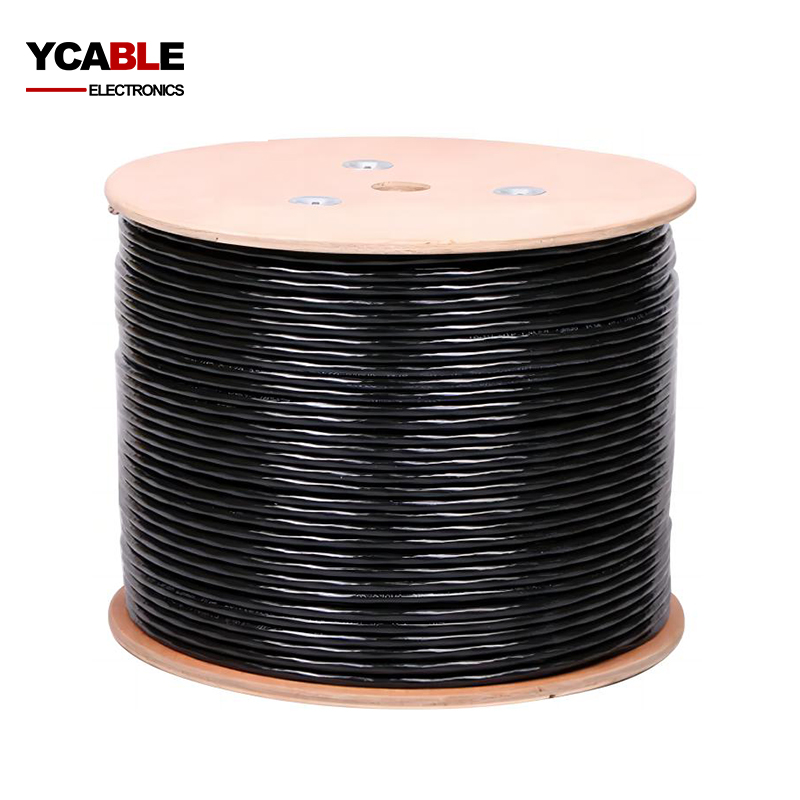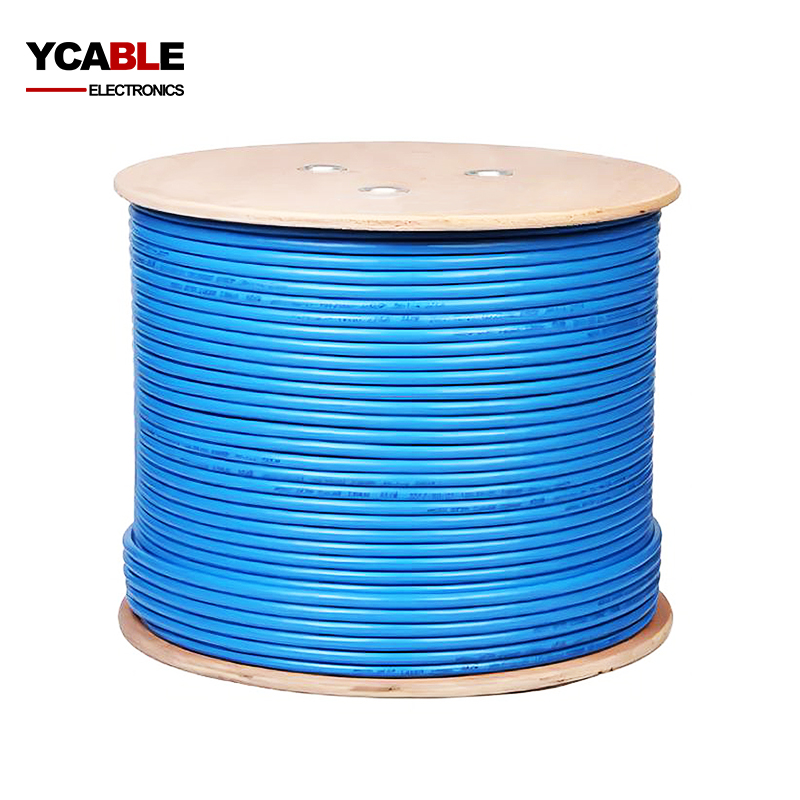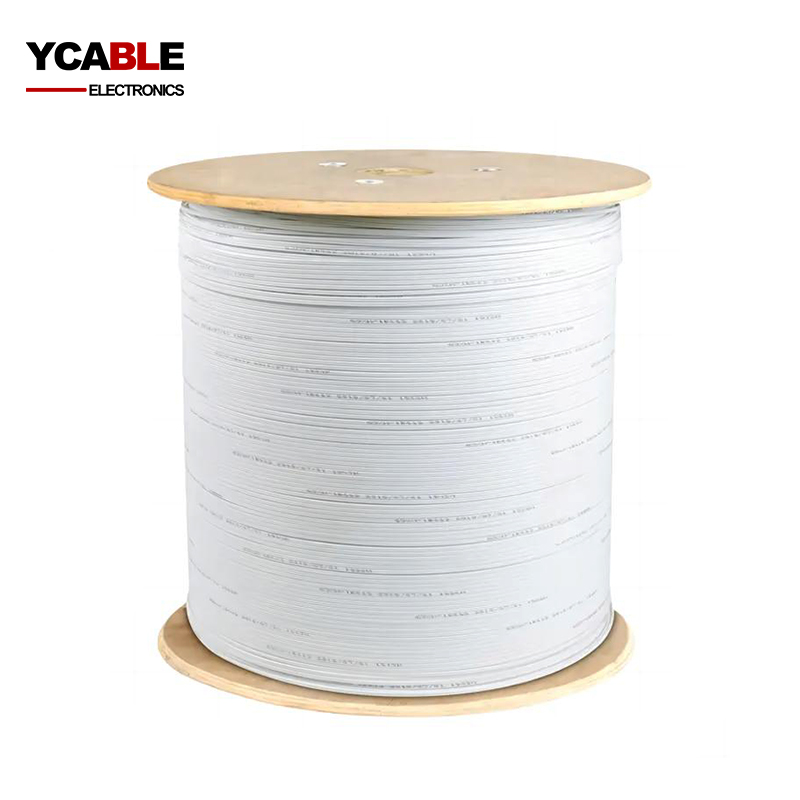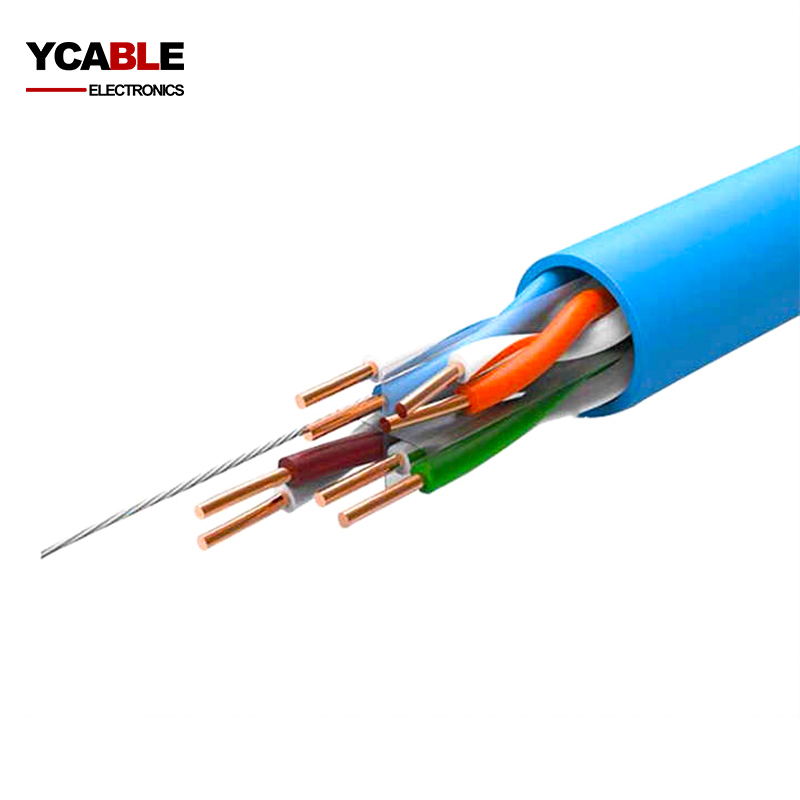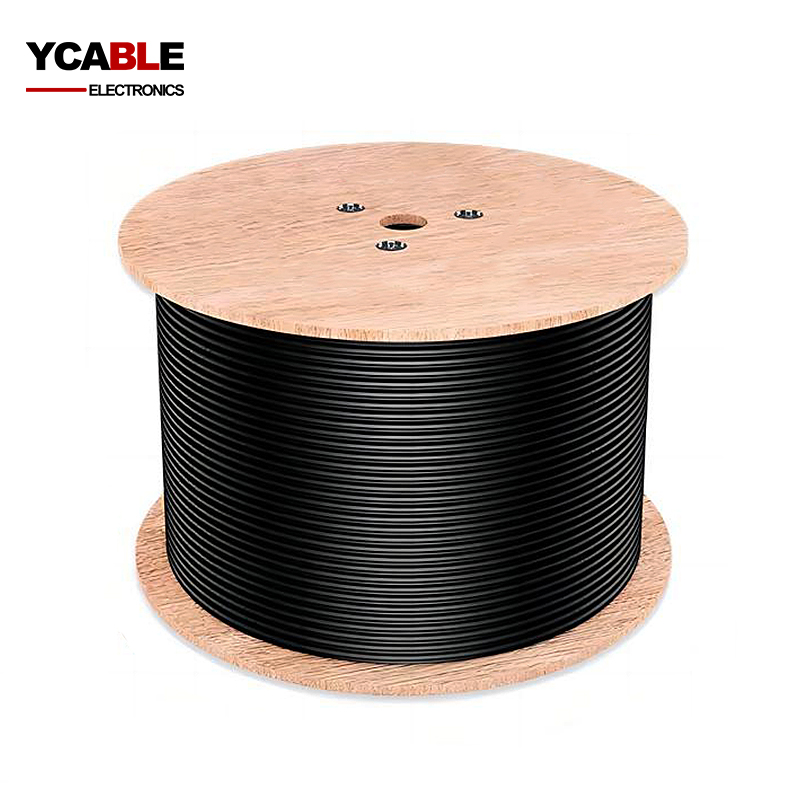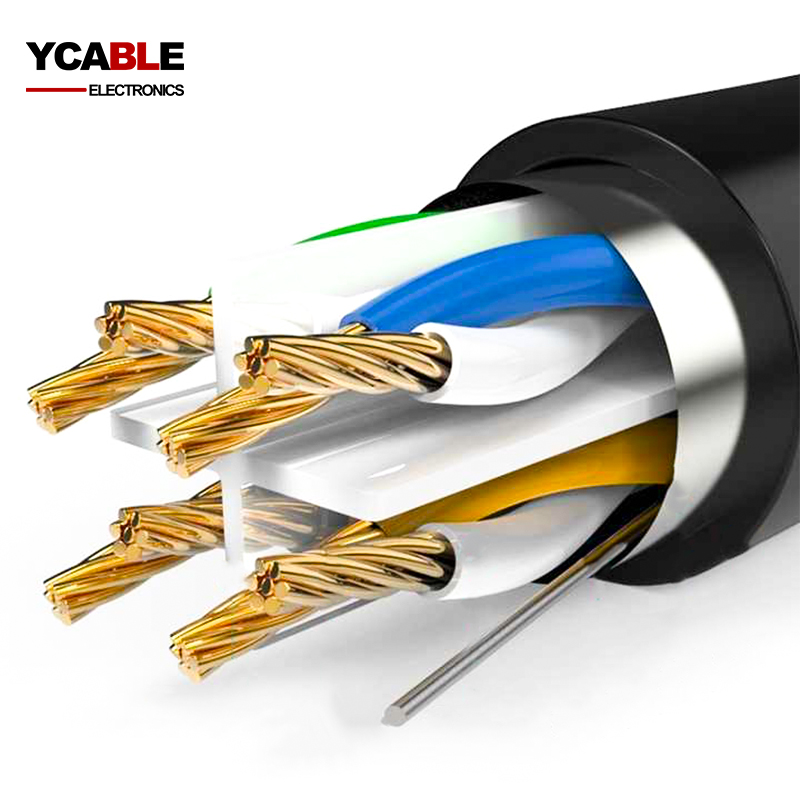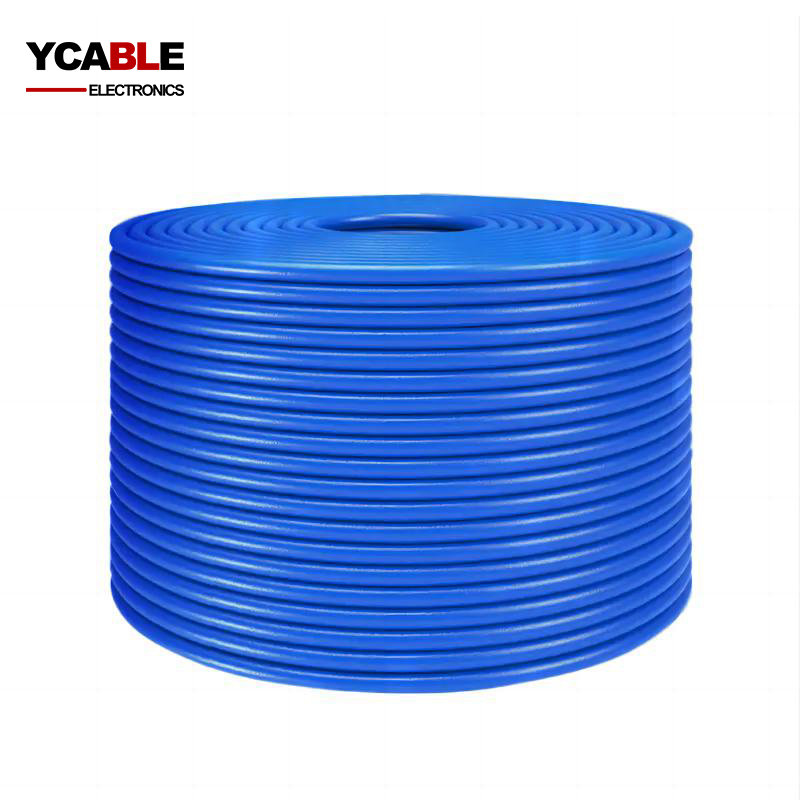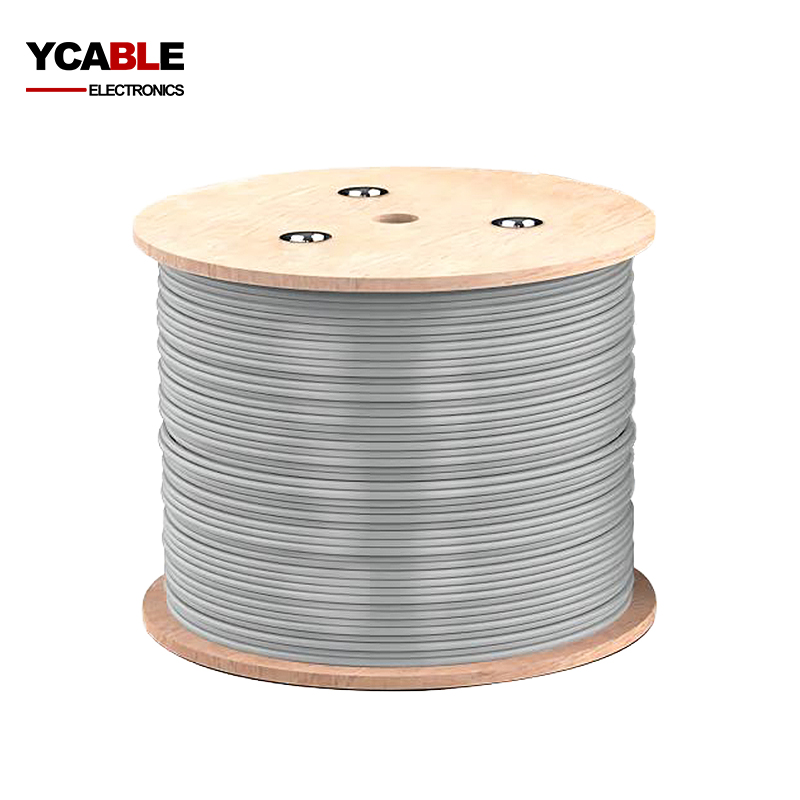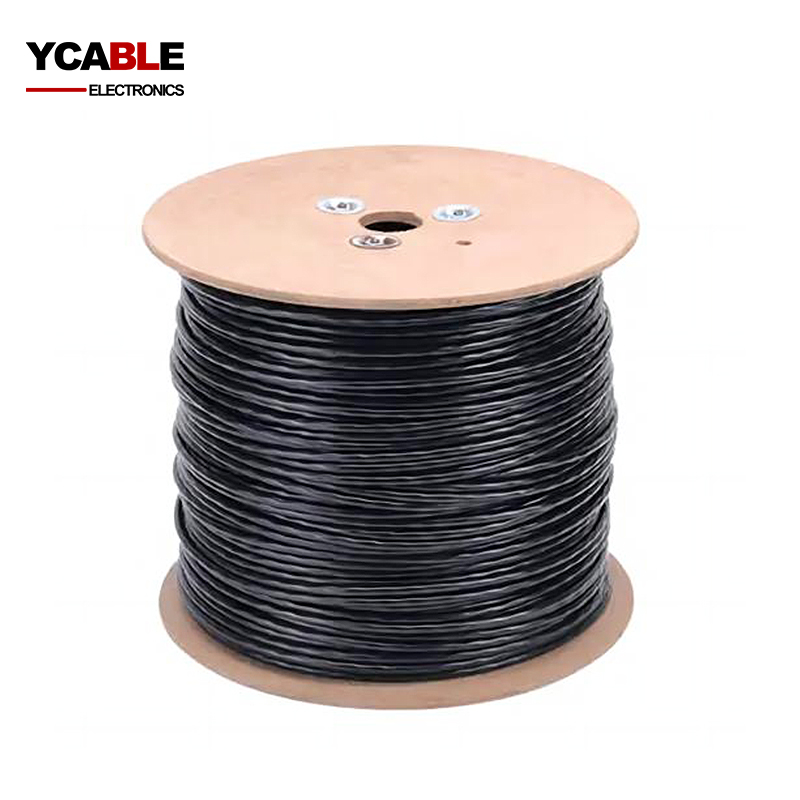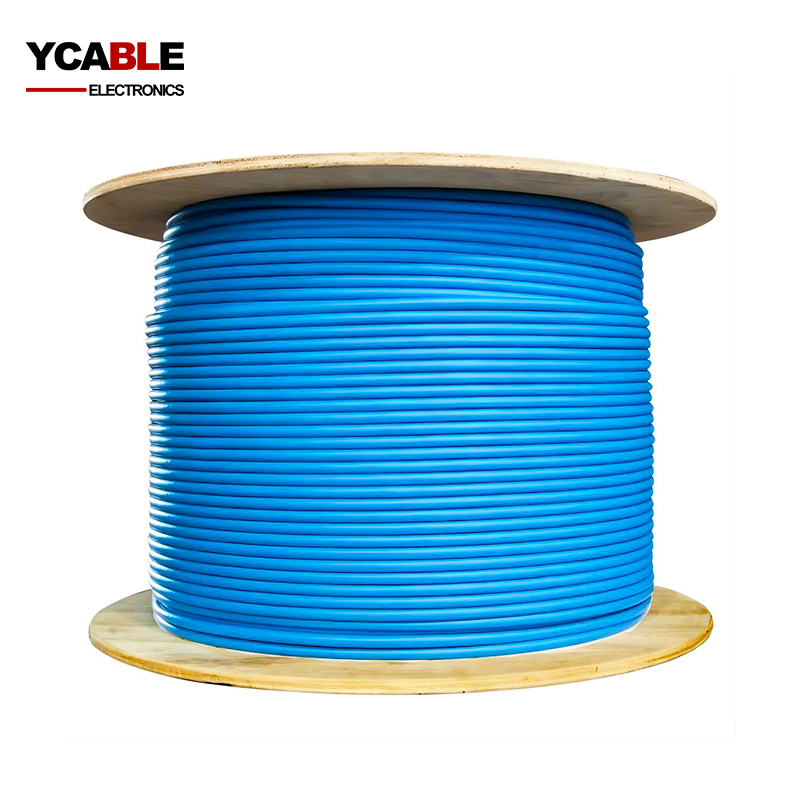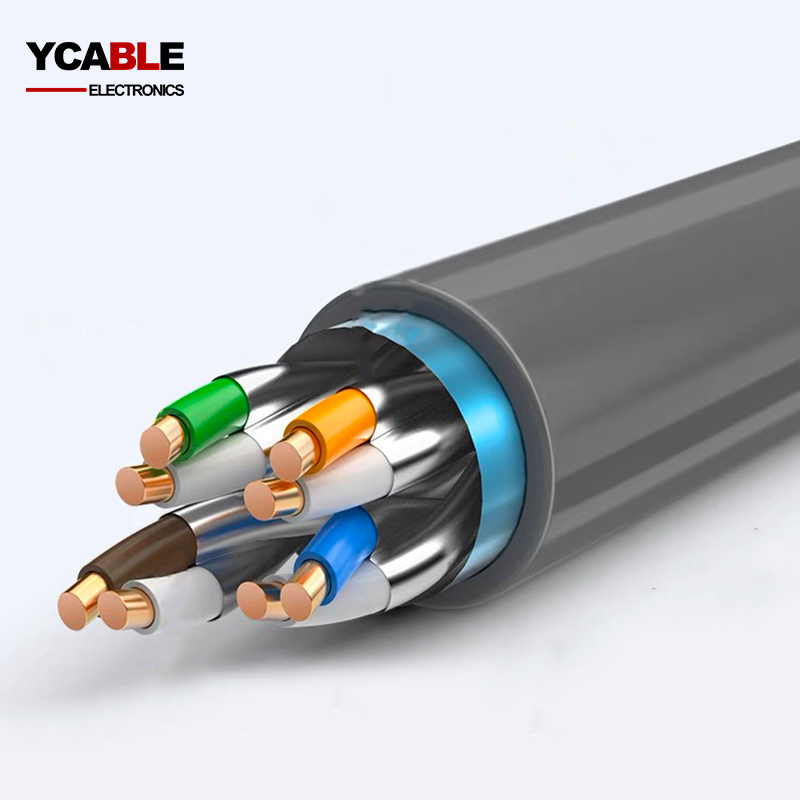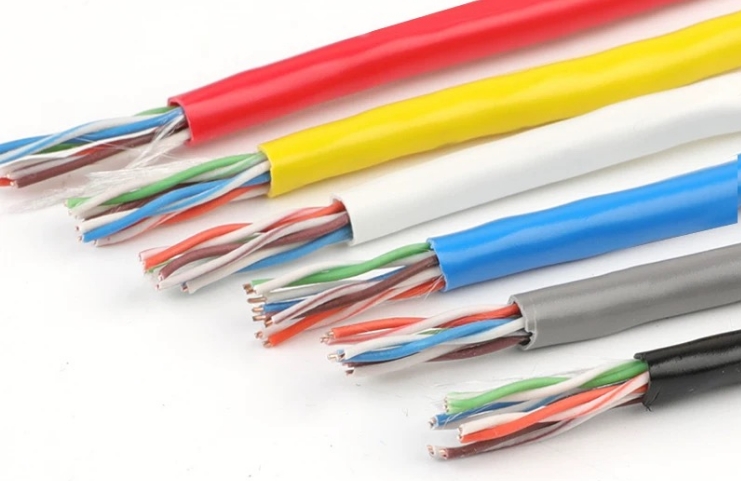Best Ethernet Cable CAT5E CAT6 CAT7 CAT8 Manufacturers CCA Copper Network LAN Cable Suppiler
Ethernet Cable Catalog
CCA Ethernet Cable UTP CAT5E
CCA Ethernet Cable CAT5E UTP 4pair 24awg 4x24AWG network cable Lan Cable custom copper c
CAT5E wire UTP LAN cable
100ft 1000ft CAT5E wire UTP 4pr 24awg network cable pure copper OFC ethernet cable
CAT5E wire SFTP LAN cable
1000FT CAT5E SFTP cable LSZH double shielded ethernet network cable
CCA Ethernet Cable UTP CAT6
Best 100FT 305m 4 pair 23 gauge CCA Ethernet Cable UTP CAT6 Lan cable bulk cable wiring
CAT6 wire UTP LAN cable
100FT 305m 23 Gauge CAT6 UTP ethernet cable OFC pure copper network lan cables manufactu
CCA Ethernet Cable FTP CAT6
CCA Ethernet Cable CAT6 U FTP Al-Foil shielded weatherproof bulk network cable manufactu
CAT6 wire FTP LAN cable
200FT CAT6 FTP cable shielded ethernet network LAN cable manufacturer in China
CAT6 wire SFTP LAN cable
1000FT CAT6 SFTP shielded ethernet LAN cable outdoor cable manufacturer in China
CAT6A wire UTP LAN cable
1000FT 4 pair CAT6A UTP cable CAT6E wiring ethernet network LAN cable manufacturer
CAT6A wire FTP LAN cable
Custom 1000FT CAT6A FTP Cable CAT6E F/UTP shielded ethernet shielding network OFC copper
CCA Ethernet Cable FFTP CAT6A
20FT 50FT 100FT1000FT CAT6A FFTP shielded CCA ethernet network cable with Al-Foil shield
Why choose Ycable Electronics?
We bring together the services and technologies that solve your business problems. We will recommend the most suitable network cable according to your requirements. We can accept customization and OEM/ODM production
What is the ethernet cable?
Definition: Primarily, an Ethernet cable is a crucial network cable in wired network infrastructures. It plays a pivotal role in linking devices such as computers, routers, and switches, thereby enabling data exchange within Local Area Networks (LANs) and more expansive network systems.
Composition: Ethernet cables are constructed with multiple pairs of copper wires twisted together. In specific variants like the CCA (Copper Clad Aluminum) Ethernet cable, there's a composite structure where aluminum is coated with copper. This twisting is deliberate to diminish interference and assure uninterrupted data flow.
Types: As Ethernet cables have evolved, several categories have emerged, each crafted to meet distinct performance needs and environmental conditions:
- CAT1 to CAT4: Now largely outdated, these were initially used for telephone data communication and in early LAN setups.
- CAT5: Previously a norm, it achieves speeds up to 100 Mbps.
- CAT5e: This improved version of CAT5 supports up to 1 Gbps.
- CAT6: CAT6 cables, designed for enhanced performance and minimized interference, can handle up to 10 Gbps over limited distances.
- CAT6A: A refined version of CAT6, it maintains 10 Gbps speed across more extended ranges.
- CAT7: Recognized for its stringent interference standards, it can achieve up to 10 Gbps with a broader bandwidth.
- CAT8: The most advanced, mainly for data centers, it delivers 25-40 Gbps over concise distances.
- UTP/STP: This indicates the cable’s shielding. UTP (Unshielded Twisted Pair) is prevalent in most Ethernet cables and lacks extra shielding. STP (Shielded Twisted Pair) has added shielding to further curb interference.
Applications: Ethernet cables are ubiquitous, from homes to mammoth corporate structures. They're used in:
- LAN networks: Connecting devices within a localized area.
- Data Centers: Facilitating colossal data transfers.
- Office Networks: Joining computers, printers, and other devices.
- Home Networks: Connecting PCs, gaming consoles, and smart devices.
Why Wired?: In the age of Wi-Fi, one might wonder about the relevance of Ethernet cables. However, they offer:
- Stability: Less prone to interference compared to wireless connections.
- Speed: Especially in categories like CAT6 and above, wired connections are often faster.
- Security: Wired connections can be more secure, being less susceptible to unauthorized access.
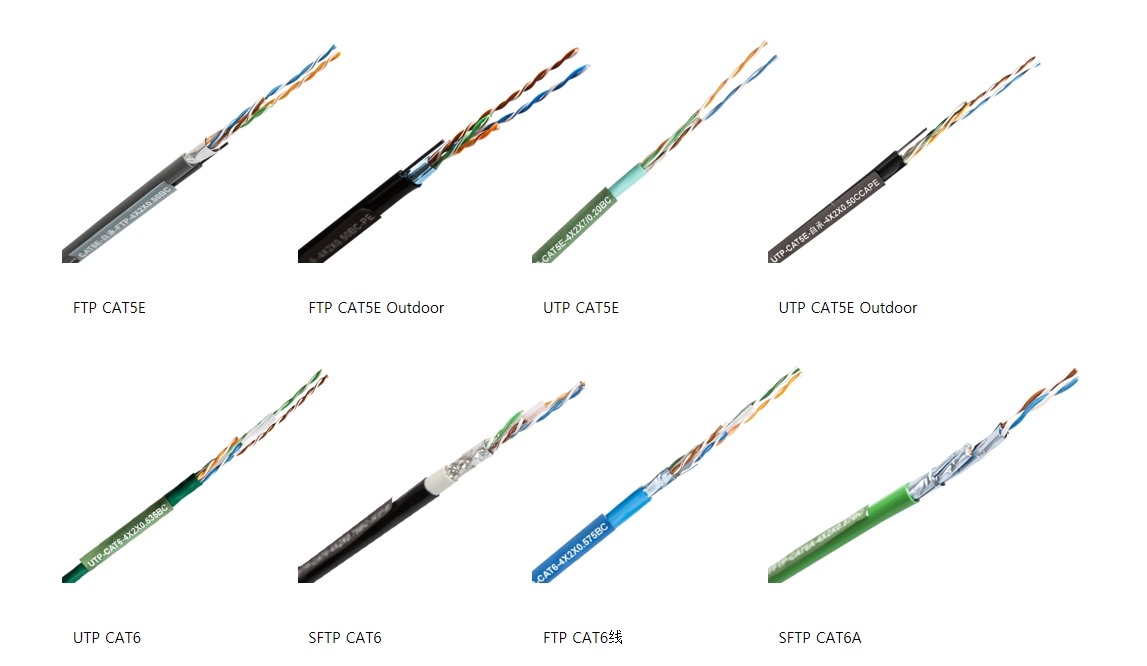
What is outdoor network cable?
Introduction to Outdoor Network Cables: Outdoor network cables stand apart in the realm of network installations. Unlike their indoor counterparts, these cables are engineered to tackle the challenges posed by outdoor environments.
What Defines an Outdoor Network Cable?: An outdoor network cable is meticulously crafted to resist the external elements. Functionally similar to indoor cables in data transmission, these outdoor variants are enhanced to resist UV rays, moisture, varying temperatures, and physical impacts.
Core Characteristics:
- UV Resistance: Outdoor cables are shielded with materials impervious to UV rays to prevent degradation.
- Waterproofing: These cables may incorporate gel-filled or water-blocking tape interiors to avert water damage, essential for maintaining operation in damp conditions.
- Temperature Adaptability: Crafted to function effectively in extreme temperature ranges, these cables are well-suited for diverse climatic conditions.
- Enhanced Durability: Anticipating outdoor risks, these cables possess a thicker, more durable sheath.
- Interference Shielding: Often, these cables come with additional shielding to reduce electrical interference.
Predominant Varieties:
- Direct Burial Cables: Designed for underground installation without extra conduit, typically featuring gel-filling for moisture resistance.
- Aerial Cables: Tailored for overhead installations, some equipped with support wires for added stability.
- Practical Applications:
- Outdoor Wi-Fi Networks: Ideal for linking outdoor Wi-Fi access points in large areas or public spaces.
- Inter-building Connectivity: Useful in network setups involving multiple nearby buildings.
- Outdoor Surveillance: Essential for connecting outdoor security cameras and systems.
- Industrial and Agricultural Use: Suitable for harsher environments where regular indoor cables might fail.
Purchase Considerations:
- Cable Length: Assess the necessary length, factoring in a bit extra for contingency.
- Environmental Factors: Take into account the specific outdoor challenges, like flooding risks or high UV exposure.
- Data Speed Compatibility: Choose a cable category (e.g., CAT5e, CAT6, CAT7) that aligns with your data transmission requirements.
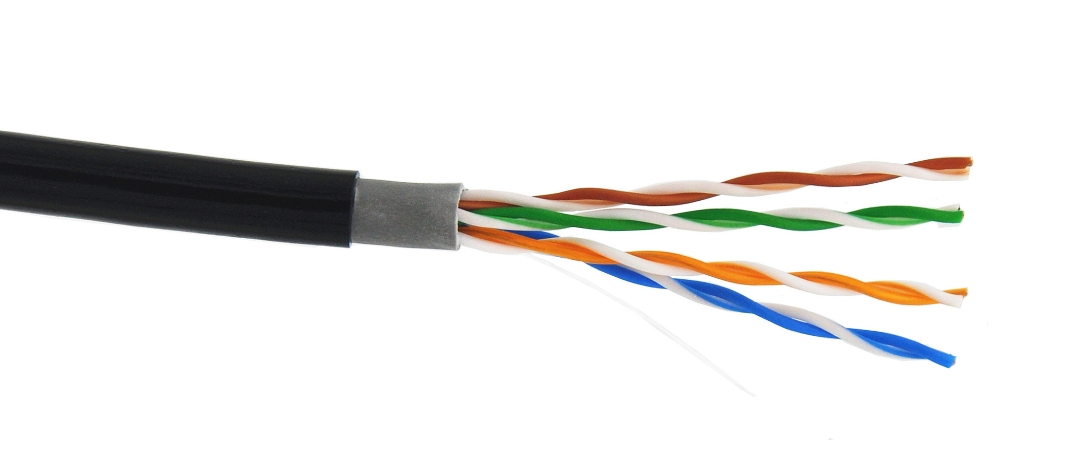
Which network/ethernet cable type is most unsusceptible to signal interference?
To understand which network or Ethernet cable type is least susceptible to signal interference, it's important first to grasp the basics of Ethernet cables:
- CAT5: With a maximum transmission frequency of 100MHz and a speed of 100Mbps, CAT5 is now largely outdated.
- CAT5E: Similar to CAT5 in frequency, CAT5E can achieve speeds up to 1000Mbps, making it suitable for gigabit networks. It's the most commonly used today.
- CAT6: Boasting a 250 MHz transmission frequency, CAT6 supports speeds up to 1 Gbps, aligning with gigabit network requirements.
- CAT6A: With a higher frequency of 500 MHz, CAT6A is capable of 10 Gbps speeds, fitting for 10 Gigabit networks.
- CAT7: This advanced shielded twisted pair cable uses high-purity oxygen-free copper for low resistance, supporting frequencies up to 600 MHz and speeds of 10 Gbps.
Cable performance is not solely dependent on conductor size for combating interference. The quality of copper and its purity significantly influence performance.
To enhance anti-interference capabilities in production, we use different types of shielding like FTP (one Aluminum Foil Shielding), FFTP (double Aluminum Foil shielding), and SFTP (Aluminum Foil and copper braiding shielding). The hierarchy of interference resistance is SFTP > FFTP > FTP > UTP.
Additionally, the effectiveness in resisting interference is also influenced by the shielding ratio and weaving density. A higher shielding ratio and consistent lay distance in the twisted pairs contribute to stronger anti-interference capabilities.
Selecting a professional supplier is crucial for addressing specific needs regarding signal interference. If further information is needed, reaching out to an expert or manufacturer is advisable.
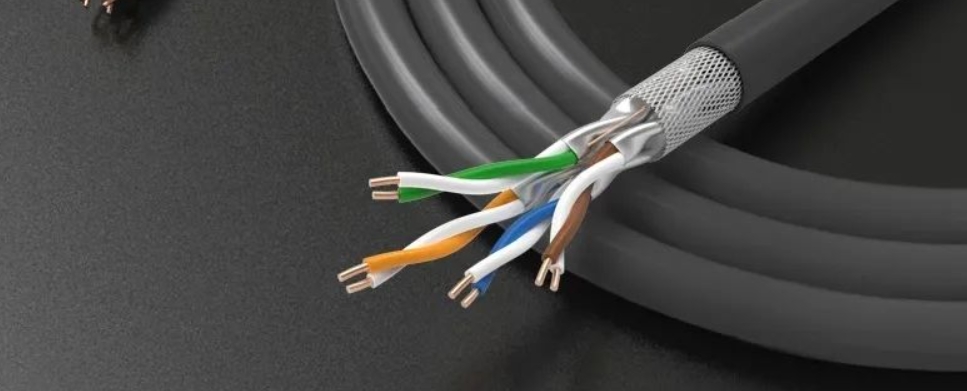
Does ethernet cable length matter?
We hope that the network cable can be used as long as possible, but this has a very difficult coefficient. Due to the attenuation of data signals transmitted over the network cable, the consumption of excessively long network cables can exceed the limit. At this time, the signal strength received by the equipment on the opposite end of the network cable will be very weak, and the possibility of errors in the transmission data carried by the data signal will increase, resulting in a rapid increase in the bit error rate - it is impossible to identify useful data signals from background noise, so it is not possible to apply ultra-long network cables without restrictions.
So, how long is the appropriate network cable? There is a mandatory requirement in the specifications for intelligent buildings - 100 meters.
Because for most indoor wiring, a length of 100 meters is sufficient. The network cable manufacturer produces the network cable according to this consumption value. However, this is not certain. If the quality of the network cable is relatively good, the consumption is small. It is possible to appropriately increase the point application distance. The default principle of 10% float is usually allowed in the specification (TIA568C). Or simply use the upper numerical limit of "transmission delay" to limit the length of the network cable (this parameter may be described later). To be safe, the length of the link should preferably not exceed 100 meters (during construction, the length limit is 90 meters, with 10 meters left for equipment jumpers at both ends). Otherwise, the test results will be judged as unqualified.
In addition, removing the network cable itself can cause signal attenuation, and its anti-interference ability is also crucial. The cost of copper cores accounts for 75% to 85% of the cost of the entire network cable. The most serious problem is that of copper cores. If the quality of the applied network cable is unqualified and continues to suffer interference over such a long distance, the data transmission quality is obvious.

How long does the ethernet cable last?
1. The lifetime of the network cable depends on the environment. In normal environments, it will not be a problem after decades of use. if the environment is humid, the ultraviolet rays are strong, the temperature is high, and the environment is harsh, it will reduce the service life of the network cable. Therefore, we need to recommend a more suitable network cable based on your use environment.
2. Depending on the quality of the product, especially the material of the product, about the conductor, pure copper is better than CCA(copper-clad aluminum), and New PVC/LSZH material is better than recycle material.
What is cca ethernet cable?
In the intricate network of cables, you'll soon come across a key term: CCA. Standing for Copper Clad Aluminum, this term becomes pivotal when linked with 'Ethernet cable', illuminating the progressive shifts in networking connectivity. Here's an in-depth look:
- Composition: Central to a CCA Ethernet cable is an aluminum conductor sheathed thinly in copper. This architecture is a lighter, more budget-friendly variant compared to solid copper cables.
- Why Opt for CCA?: CCA Ethernet cables have surged in popularity within the networking cable sphere, largely due to their cost-effectiveness. They offer an economical solution for businesses expanding their LAN networks without heavy financial outlay. Additionally, the copper-aluminum amalgamation delivers decent conductivity alongside reduced heft, presenting an appealing option for various applications.
- Usage and Applications: Although CCA Ethernet cables may not be the first pick for high-stakes, performance-intensive networks owing to possible signal degradation under certain conditions, they have carved out a role in specific LAN cable deployments where a cost-performance balance is crucial.
- Cautions: Despite the benefits of CCA Ethernet cables, it's critical to note their potential limitations in certain LAN setups. Quality can fluctuate, and for demanding tasks, pure copper Ethernet cables are often the better fit. Expert guidance (such as from YCABLE ELECTRONICS) is recommended to ensure the most suitable selection for your unique requirements.
Wrapping Up: The domain of network cables is extensive and diverse. From conventional Ethernet cables to the specialized CCA Ethernet variety, grasping these subtleties is key to maintaining smooth and effective connectivity. YCABLE ELECTRONICS stands ready to assist with custom solutions in colors, lengths, or types. In the LAN cable world, it's about forging the appropriate connections.
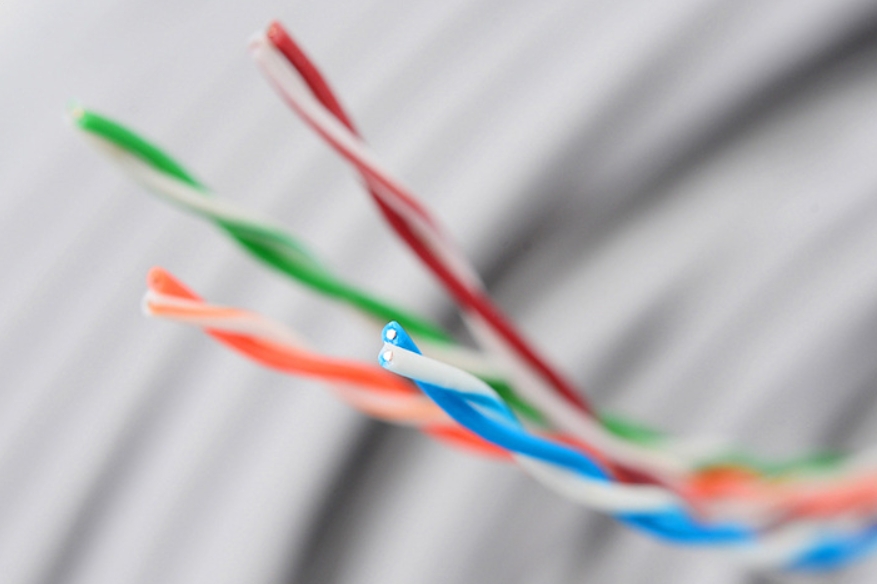
CCA Ethernet Cable vs. Copper Ethernet Cable: A Comparative Analysis
Ah, the age-old debate in the world of networking: CCA (Copper Clad Aluminum) versus pure Copper Ethernet cables. Just like choosing between a cappuccino and an espresso, both have their merits, but it boils down to your specific needs. Let’s jump into the intricacies of these two contenders in the LAN cable arena.
Composition:
- CCA Ethernet Cable: A hybrid, this cable is made of an aluminum core that's thinly coated with copper. It's like the swiss army knife of network cables – not perfect for every job but certainly handy in specific scenarios.
- Copper Ethernet Cable: The gold standard (metaphorically speaking), it's made entirely of copper. Think of it as the tailored suit of network cables: classic, reliable, and fits most occasions seamlessly.
Cost-Effectiveness:
- CCA Ethernet Cable: One of the main attractions of CCA is its cost. Since aluminum is generally cheaper than copper, you get a network cable that's lighter on the wallet.
- Copper Ethernet Cable: While they tend to be pricier, their performance often justifies the cost, especially for demanding network scenarios.
Conductivity & Signal Quality:
- CCA Ethernet Cable: While CCA cables can transmit data efficiently, they might experience a tad more signal loss compared to their pure copper counterparts, especially over long distances.
- Copper Ethernet Cable: Superior in conductivity, these ensure minimal signal loss, making them ideal for high-demand, high-performance networks.
Flexibility & Durability:
- CCA Ethernet Cable: Due to the aluminum core, these can be slightly more brittle, so one must handle with care during installation to prevent breakage.
- Copper Ethernet Cable: Known for its flexibility, it’s more resilient during installations, bending without breaking.
Applications:
- CCA Ethernet Cable: Ideal for applications where cost is a significant factor and where ultra-high-performance isn't a strict requirement.
- Copper Ethernet Cable: Perfect for critical network installations, high-speed data centers, and where consistent, top-notch performance is non-negotiable.
Closing Thoughts:
While CCA Ethernet cables offer a cost-effective solution for many network cable applications, it’s paramount to understand the demands of your specific LAN network. The golden rule? Always consult with seasoned experts. Speaking of which, if you’re ever in doubt, YCABLE ELECTRONICS is at your beck and call, ensuring you get the best Ethernet cable tailored to your needs.
Is cca ethernet cable good?
In the realm of networking, the eternal debate rages on: CCA (Copper Clad Aluminum) versus pure Copper Ethernet cables. It's like choosing between a frothy cappuccino and a bold espresso – both have their allure, but it all boils down to your unique requirements. Let's dive into the intricacies of these LAN cable contenders.
Composition:
- CCA Ethernet Cable: This hybrid marvel boasts an aluminum core delicately cloaked in a copper veneer. It's akin to a versatile multitool in the world of network cables, excelling in specific scenarios.
- Copper Ethernet Cable: The metaphorical gold standard, it's crafted entirely from copper. Picture it as the timeless, dependable suit in the realm of network cables, fitting seamlessly into most occasions.
Cost-Efficiency:
- CCA Ethernet Cable: A prime attraction of CCA is its budget-friendly nature. With aluminum being generally more affordable than copper, it's the wallet-conscious choice.
- Copper Ethernet Cable: While it may command a higher price, the performance often justifies the cost, particularly in demanding network setups.
Conductivity & Signal Quality:
- CCA Ethernet Cable: While proficient in data transmission, CCA cables may encounter marginally more signal loss, especially over extended distances when compared to pure copper counterparts.
- Copper Ethernet Cable: Showcasing superior conductivity, these cables minimize signal loss, rendering them ideal for high-performance networks with stringent demands.
Flexibility & Durability:
- CCA Ethernet Cable: The aluminum core makes these cables slightly more delicate, necessitating careful handling during installation to avert breakage.
- Copper Ethernet Cable: Renowned for their flexibility, these cables exhibit resilience during installation, bending without fracturing.
Applications:
- CCA Ethernet Cable: Excelling in scenarios where cost constraints weigh heavily and ultra-high performance isn't an absolute necessity.
- Copper Ethernet Cable: Tailor-made for critical network installations, high-speed data centers, and environments demanding unwavering, top-tier performance.
Parting Thoughts: While CCA Ethernet cables present a cost-effective solution for numerous network cable needs, it remains paramount to grasp the specific requisites of your LAN network. The guiding principle? Seek counsel from experienced experts. And when in doubt, remember that YCABLE ELECTRONICS stands ready to assist, ensuring you acquire the finest Ethernet cable tailored precisely to your needs.
Where to buy bulk ethernet cable?
Looking for a substantial quantity of Ethernet cable, are you? Buying in large quantities can be not only cost-effective but also ensure that you are well-prepared for any networking endeavor. Allow me to present a concise guide to aid you in making the optimal procurement decision:
Direct from Manufacturers:
YCABLE ELECTRONICS: Situated in China, YCABLE ELECTRONICS is an esteemed OEM cable and wire manufacturer. They specialize in a diverse range of network cables, encompassing copper wire Ethernet cables and CCA Ethernet cables. Their added advantage lies in the ability to customize cable color and length, making them the preferred choice for tailored bulk orders.
Online Marketplaces:
- AliExpress: Particularly advantageous if you seek manufacturers based in China or Asia.
- Amazon Business: Offers opportunities for bulk purchases with potential business discounts.
- eBay: Some sellers on eBay offer bulk Ethernet cables; however, it is imperative to exercise diligence in verifying the quality and authenticity of listings.
Wholesale Distributors:
Several distributors specialize in catering to B2B clientele and can furnish Ethernet cables in sizable quantities. Seek out those with expertise in networking equipment.
Local Electronics and Hardware Stores:
Depending on your geographic location, certain prominent electronics or hardware stores may extend bulk purchase options for Ethernet cables.
Networking & IT Expos:
Attendance at industry-specific expos or conventions can expose you to a myriad of manufacturers and suppliers. It also affords you the opportunity to physically inspect product quality and engage in negotiations.
Recommendations:
Tap into your professional network. Colleagues within the IT or networking sphere may possess invaluable insights or contacts conducive to bulk procurement.
Considerations to Ponder:
- Quality Trumps Quantity: Always ascertain that the cable's quality aligns with your networking requisites, particularly when choosing between variants such as CCA Ethernet cables and pure copper.
- Customization: In need of specific colors or lengths? Certain suppliers, like YCABLE ELECTRONICS, offer customization services tailored to precise specifications.
- Certifications & Standards: Ensure that the cables conform to industry standards and possess requisite certifications, thereby guaranteeing optimal performance and safety.
Concluding Thoughts: As you embark on the quest for bulk Ethernet cable, it is paramount to place a premium on quality, reliability, and, if deemed necessary, customization. Remember that success in networking lies in the meticulous attention to details. In your pursuit of seamless data flow, should the need for expertise arise, rest assured that YCABLE ELECTRONICS is merely a click or a call away, poised to assist you in your endeavors.

